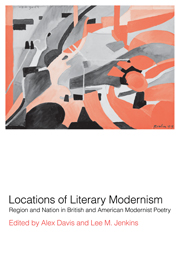Book contents
- Frontmatter
- Contents
- Notes on contributors
- Preface
- INTRODUCTION
- PART ONE OBSTINATE ISLES: THE ANGLO-CELTIC ARCHIPELAGO
- 1 MacDiarmid in Montrose
- 2 Bunting and Welsh
- 3 Antithesis of place in the poetry and life of David Jones
- 4 ‘Shut, too, in a tower of words’: Dylan Thomas' modernism
- 5 ‘Literally, for this’: metonymies of national identity in Edward Thomas, Yeats and Auden
- 6 Reactions from their burg: Irish modernist poets of the 1930s
- PART TWO AN AMERICAN PLACE
- Notes
- Index
1 - MacDiarmid in Montrose
Published online by Cambridge University Press: 06 July 2010
- Frontmatter
- Contents
- Notes on contributors
- Preface
- INTRODUCTION
- PART ONE OBSTINATE ISLES: THE ANGLO-CELTIC ARCHIPELAGO
- 1 MacDiarmid in Montrose
- 2 Bunting and Welsh
- 3 Antithesis of place in the poetry and life of David Jones
- 4 ‘Shut, too, in a tower of words’: Dylan Thomas' modernism
- 5 ‘Literally, for this’: metonymies of national identity in Edward Thomas, Yeats and Auden
- 6 Reactions from their burg: Irish modernist poets of the 1930s
- PART TWO AN AMERICAN PLACE
- Notes
- Index
Summary
A glance at the records of literary history shows – in contradistinction to the old sneer, ‘Can any good thing come from Nazareth?’ – that few indeed of our writers have been born and written their books in the great cities in comparison to the number belonging to – and preferring to continue working in – our small towns… In a very real sense in the ’Twenties Angus (and particularly Montrose) was the cultural centre of Scotland.
Christopher Murray Grieve, who went on to write under the name Hugh MacDiarmid and a plethora of other pseudonyms, reacted enthusiastically to Ulysses and The Waste Land in 1922. Both works were important to his poetry. Again, he relished Wallace Stevens' Harmonium in 1924, and, whether as a reviewer for the New Age or for many other periodicals, he inveighed against ‘provinciality of outlook’ and was alert to the developments of international modernism. My chapter starts with those reminders, because most of it will deal with MacDiarmid's particular location in small-town Scotland. There, without at all renouncing international concerns, he matured in various areas of his work through an interaction with the minutely local. He fused the immediate and vernacular with the transnational and synthetic practices of modernist writing. In so doing, he can be seen as developing an exemplary aesthetic of the local–international that is in some ways as bound up with participation in the events of a small community as is the work of Robert Burns.
- Type
- Chapter
- Information
- Locations of Literary ModernismRegion and Nation in British and American Modernist Poetry, pp. 33 - 56Publisher: Cambridge University PressPrint publication year: 2000
- 2
- Cited by



